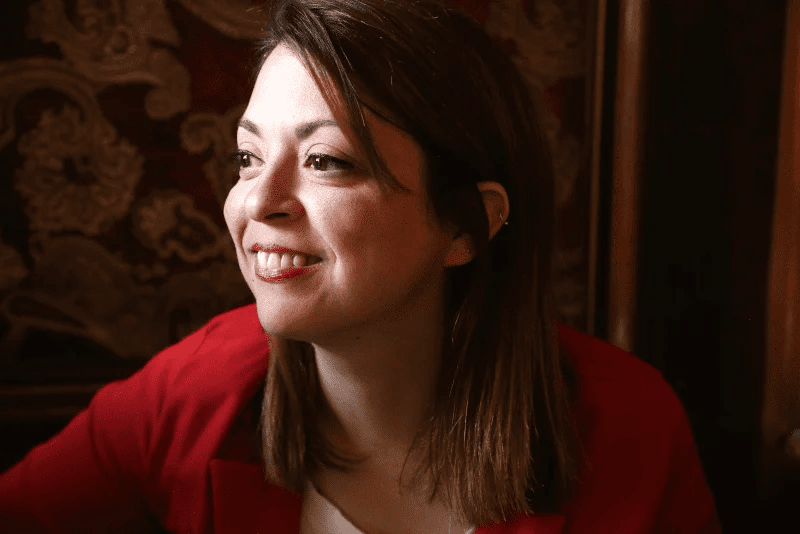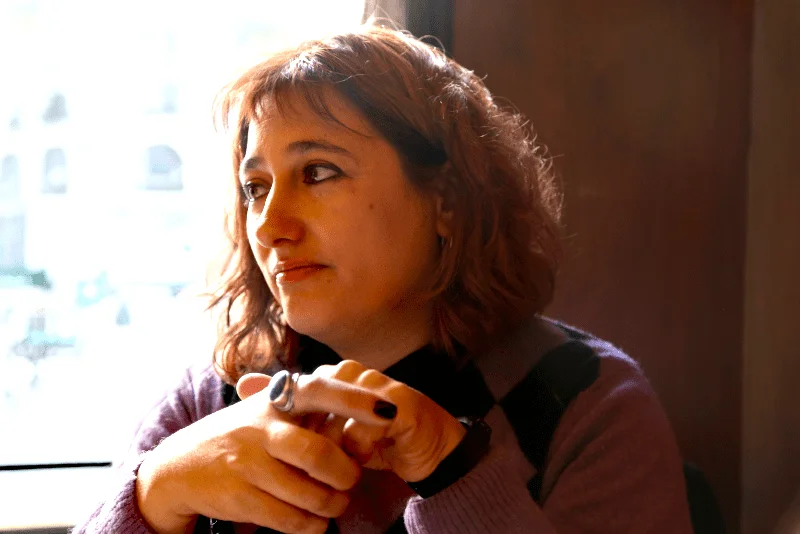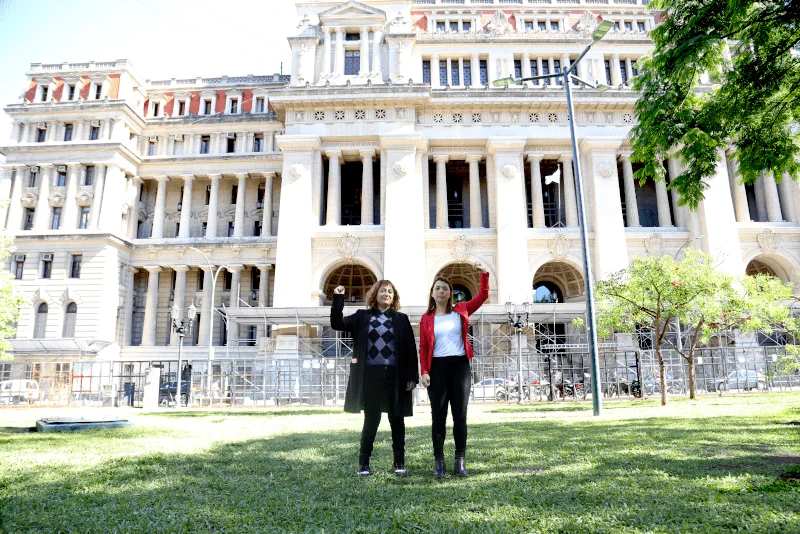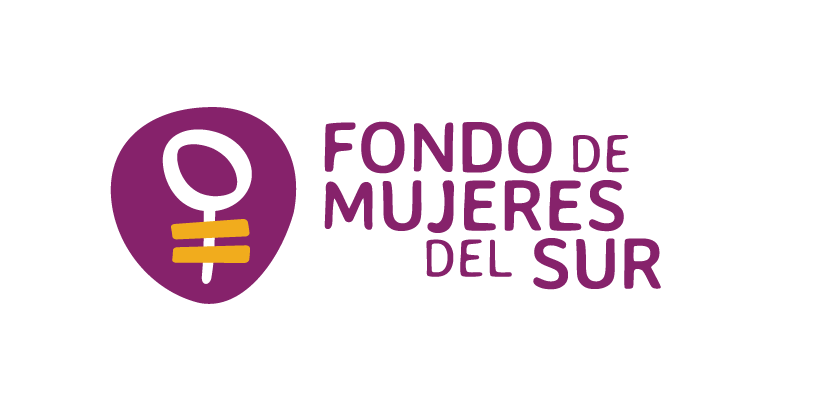Earlier this winter, we spoke with members of Abofem Argentina, an organisation that aims to deconstruct the legal system, incorporate a culture of listening along with a gender perspective in professional practices and in the court house corridors. We spoke about their collective’s actions, pending cases and the difficult process of reconciling their activism and personal lives.
Report: Eloísa Oliva
Translation: Christina Hamilton
Photos: Clara Muschietti for Fondo de Mujeres del Sur
Through the window of the elegant old café where we met with Melisa and Sandra (founder and early member of Abofem Argentina respectively), you can see the Court House buildings. We are in the city of Buenos Aires, Argentina. The seven-storey, neoclassical building houses the headquarters of the Judiciary and the Supreme Court of Justice of the Nation. It seems too easy – you just have to walk across a square to reach that decision factory. There not just any decisions are made, but those that affect lives.
What happens in those corridors, for people outside the legal world, is always a little obscure, indecipherable. A little removed and ceremonious. It is in the realm of that degree of ambiguity and otherness that Abofem (which stands for Feminist Female Lawyers in Spanish) persists and works. It is that degree of ambiguity that they try to remove, asking incisive questions and making proposals that bring a “layer of reality” to resolutions made on far removed desktops for ordinary men and women. They also remove some of that distance that is imposed as a practice.
The organisation
Abofem Argentina started in 2018 and spread by contagion. “Late in 2017, I was feeling growing discomfort. I felt that my profession was missing something. Like there was a lack of cohesion, the legal profession can be very lonely,” says Melisa. At the same time, she met with some Chilean colleagues, who were in Buenos Aires for a Criminal Law Congress. They said that they had founded Abofem in Chile, that there were more than ten thousand female lawyers, and that they had caused a revolution.
“I was stunned; I couldn’t believe what I was hearing. After that meeting I said: We have to start Abofem Argentina! This is how the organisation started in October 2018.
The first thing they did was open a call for colleagues to join. One of the ideas was to ensure the organisation was federal and, furthermore, to make sure it was “a space where women lawyers could give to each other, but also give to themselves,” they say.
“It was very clear that the objective was to deconstruct the practice of law. And we were increasingly talking to more colleagues who were experiencing the same thing, who really felt alone professionally, who wanted to share their knowledge. That they just needed a safe space to do it, to provide support to each other,” they add.
Sandra had just become a mother when Abofem was created. At some point during the discussion, she tells how she wrote letters and answered messages with one hand, while with the other she held Ema, who is now five years old. We also talk later about how Abofem is a friendly space for activists and mothers.
Now, while in the busy and bustling café the door opens constantly and lawyers come in to have their morning coffee – suits, ties and high heels are everywhere – Sandra lets fly a key premise that intersects the organisation’s way of thinking: “Lawyers are trained to speak, not to listen”.


Learn everything again
In 2020, isolated and each working from home, they decided to promote training initiatives, and they began to grow at an exponential rate. From one month to the next, they went from having three or four affiliates to having ten or twelve across Argentina. There were 200 member lawyers, not counting the students doing the training courses.
What were the training courses on? Everything. “For example, we realised that we’d all graduated without any gender training,” they explain. Guided by the idea of listening and the need to work together, Abofem’s training opportunities aimed to dismantle what had been learned: “dismantle what they taught us at university, because it is wrong,” they conclude.
Initially focused more on theory, and then on professional practice, they covered a wide range: “Everything you can imagine: procedures, litigation, etc.,” Melisa illustrates. The idea was to generate a space for training and collaboration, to socialise knowledge.
As expected, the training processes were not devoid of complications, hiccups, twists and turns. “Do know what it is like to deconstruct a lawyer and tell her she will listen, she will not talk and she’s going to do it for free, she is going to get training. That she’s not going to compete with the others here, that we are peers, not enemies. There are people who can handle it, and people who can’t,” they say.
Sandra says that this is the biggest struggle they have within the organisation – not competing against each other, because, she adds, “they train us to compete amongst ourselves.” Melisa contributes that the legal profession is highly individualistic, and that working together collectively is very difficult. “Getting women lawyers out onto the streets is one of the biggest challenges we have had. Because they don’t prepare you for that, they prepare you for the little jackets, the nice office”.
Acciones
Melisa goes back to 2018, when Abofem was just born and the case of Thelma Fardín [1], an Argentine actress who accused fellow actor Juan Dartés of rape, hit the media. At that time, questions via their networks skyrocketed. Then the need became clear: the need to provide free legal advice.
That idea was transformed into a tool in collaboration with the Red de Psicólogxs Feministas (Network of Feminist Psychologists), free Psycholegal Counseling. “Bar Associations have wanted to report us – and I mean associations of male lawyers because they are for male lawyers – for spreading the word that we were going to provide free legal advice”, Sandra concludes.
“We’ve gotten involved in all sorts of things,” they say, laughing a little, recalling with complicity the things they’ve done, among which one in particular stands out: the time they challenged the applications to fill vacancies in a public call for judges in the Federal Chamber.
According to a resolution by the Council of Magistracy, the sole control body over the Judiciary, it is established that all male and female applicants for such positions must demonstrate having undertaken gender training. On that basis, Abofem checked almost 500 resumes two days before the deadline to file the objection. Nearly 90 percent of the resumes did not demonstrate the required gender training.
Therefore, they went ahead to present the objection. “Pandemic. Torrential rain. The entire city was flooded; we were soaked through. We entered the Council of Magistracy dripping wet. Nobody wanted to sign the objection for us. It was a hot potato, there was no one who wanted to grab it,” they say.
The objection was made on behalf of Abofem. Days later, Mariana Carbajal, a journalist for a newspaper called Página/12, published the list of contested candidates, detailing the name of each male and female judge who did not have any gender training.
“I was in Chivilcoy, I’d lied to myself, I’d tricked myself and said: I’m going to take a few days off (she laughs). My mobile phone exploded. Judges wrote to me, especially female judges, trying to defend themselves, telling me that they did have gender training. They wanted to send me what they had done. One even threatened me saying that we were going to meet again,” says Sandra.
“That’s what happens. We get involved with judges who are later appointed to our cases, and they want to take away some support, and they are well aware of this,” Melisa concludes.
Although the Council decided that time to reject the objection, as a result of it the requirement for gender training became much more rigorous in the following application processes.
Maternities
According to its members, Abofem carries an important flag in relation to maternity and care. “Feminism has an outstanding debt to mothers, it always wants to exclude us but we don’t leave,” says Sandra, and continues: “I joined when my daughter was months old, she was very young. I couldn’t find anywhere within feminism for my activism where I felt comfortable. I had wanted to conceive, by choice, and I wanted to spend time with my daughter, I wanted to take care of her. So if there was one thing that made me fall in love with Abofem, it was that the organisation opened the doors to me with my whole package: I joined with my little bundle under my arm and with my baby’s bottle”.
The first activity that she then facilitated for the organisation was a discussion panel with the Feminist Maternity Collective, at Casa Brandon, a historic space for feminist and LGBT struggles in the city of Buenos Aires. “When everyone saw me with Ema and her little backpack, they said: it’s great that I can bring my kids”.
This is why the organisation’s meetings began to be held in places that had playgrounds. The children played and the women discussed how to revolutionise the legal world at the table.
The great outstanding cause
It’s already noon and the noise in the café changed. Now there is the sound of clanking cutlery as the waiters set up for the lunch service. It is still a sunny winter day, and we are going to walk across the square in a few minutes, to take some photos in front of the fenced off Palace of Justice. But first we talk about the case that brings together and summarises all the other Abofem struggles: the Feminist Judicial Reform [2].
“The big problem is there, in the Judiciary. They are the ones who have the last word in terms of declaring rights, interpreting laws. Because there are a lot of laws and they are beautiful, we do not have a legislative problem,” she summarises.
And they go against grassroots construction: “That issue of individualism, not being very empathetic, without a care perspective, without deconstructing the law – all of that is a problem. In practice, in how you work as a professional, or as a male or female judge”.
The axis that is considered central to any transformation is that of the approach taken. “It is something that today, without investing many resources, can be improved. For example, in cases of violence, the lack of training regarding how to address a situation of that type. If the initial contact at the time of reporting fails, it means that when things reach the judicial system they are already obstinate, they are already feeling frustrated”.
Melisa continues: “When we ask everyone, especially women, to go and file the report, because we need them to file a report, if the system dismisses them at that first instance, the feeling that ends up being generated is frustration, and when we start it is already too late.” There are cases when they call and say “look, I couldn’t file my complaint because their printer wasn’t working”. And you think: why didn’t they write it down on a serviette, send it by WhatsApp, by email, you can let them file the complaint and tell the woman to come back when the printer is fixed and it can be printed out. But you let them file the complaint, it is your duty!”.
“Their lack of creativity is directly related to them not taking violence seriously,” adds Sandra. And they are both referring to male and female judges: “They do not understand how important it is, they do not realise that many lives depend on them. Sometimes it has taken them a month to sign so that a mother can receive child support. Those kids don’t eat, sir, if you don’t sign! Check where your priorities are! The quick courses provided for by Micaela Law [3]are not enough,” they conclude.
Melisa asks Sandra to share about a case from 2020, in the middle of the pandemic. A client, who lived in the city of Buenos Aires, decided to move to Chivilcoy (Buenos Aires province) because it was impossible for her to pay the rent. She had lost her job and she had her own house in Chivilcoy. Her ex-husband filed an objection to prevent her from moving with their daughters. The judge complied, and asked that the woman confirm an address in the city within 48 hours. Otherwise, the children would live with their father.
Sandra came up with a solution: they would provide the address of a tent in front of the Courts. It was the only thing she could afford with the compensation money, the client had said. Then, they provided the address of the square and confirmed that to be her legal domicile. When they were summoned to the hearing, the child protection advisor asked: ‘Are you the one from the tent? “I ask you please not to move the children there because it is very cold’”.
“We had to question them,” Sandra continues. “There is something that has to do with privilege. We work with vulnerabilities, with women and people in a state of vulnerability, in these cases all privilege disappears. The law exists, but it must be reinterpreted”.
Melisa and Sandra mention other cases in which the same things happen over and over again: the difficulty to enforce payment of child maintenance, the priorities of male and female judges who often make decisions without any context, without a gender perspective or focus on the rights of children. “Behind those desks, they lose contact with reality,” they conclude. It is this dose of reality that the Feminist Judicial Reform can contribute to the most discretionary power of Argentine democracy.

[1] In December 2018, Thelma Fardin, together with the Actrices Argentinas collective publically accused Juan Darthés of aggravated sexual abuse, which occurred in Nicaragua in 2009, when she was 16 years old and he was 45. Both were participating in a tour of the show called Patito Feo. The justice system of Brazil, where the events were tried, acquitted the actor. For more information and an analysis of the case refer to this article: https://latfem.org/quien-dijo-que-era-facil/
[2] In Argentina, the National Campaign for Feminist Judicial Reform was presented on Thursday, June 29. Its central axes include: democratisation of the Judiciary and mainstreaming the perspectives of gender, diversity and childhood, interculturality and human rights across the judicial system. For more information refer to: https://www.facebook.com/reformajudicialfeminista
[3]LLaw 499, known as the Micaela Law, establishes mandatory training in gender and gender violence for all people who work in public service, in the Executive, Legislative and Judicial branches of the Nation (Argentina). The law is named in commemoration of Micaela García, a 21-year-old woman from Entre Ríos, a member of the Evita Movement, who was a victim of femicide at the hands of Sebastián Wagner. It was enacted in 2019. For more information, go to: https://www.argentina.gob.ar/generos/ley-micaela
To learn more about Abofem, you can check out their social media and website: Facebook, Instagram, Twitter and their web page.

